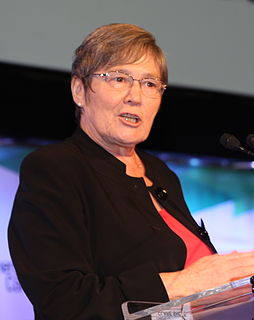A Quote by Clare Short
The Middle East is more angry than ever. I'm afraid that the sort of deceit on the route to war was linked to the lack of preparation for afterwards and the chaos and suffering that continuous - so it won't go away will it?
Related Quotes
I think the public is very reluctant to get involved in more foreign wars, especially in the Middle East. And they understand, implicitly, that we go to war in the Middle East because of oil. And if we don't want to go to war in the Middle East, then we have to do something about the oil problem. And I think that view is gaining ground in the U.S.
America is the only superpower. But our leadership is being tested in the Middle East, and some of the things that we have done in the Middle East are contributing to a potential explosion region-wide. And if that explosion gets out of hand, we may end up being bogged down for many years to come in a conflict that will be profoundly damaging to our capacity to exercise our power, to address the problems implicit in this global awakening, and we may face a world in which much of the world turns away from us, seeks its own equilibrium, but probably slides into a growing chaos.
Sadly, a U.S. invasion of Iraq 'would threaten the whole stability of the Middle East' - or so Amr Moussa, secretary-general of the Arab League, told the BBC on Tuesday. Amr's talking points are so Sept. 10: It's supposed to destabilize the Middle East. The stability of the Middle East is unique in the non-democratic world and it's the lack of change in Iraq, Iran, Saudi Arabia, Syria, Egypt that's turned them into a fetid swamp of terrorist bottom-feeders.
We're just afraid, period. Our fear is free-floating. We're afraid this isn't the right relationship or we're afraid it is. We're afraid they won't like us or we're afraid they will. We're afraid of failure or we're afraid of success. We're afraid of dying young or we're afraid of growing old. We're more afraid of life than we are of death.
Intervention in Syria is not an option. President Obama has already helped foment this civil war and supported the al-Qaeda jihadists. This is an explosive region, and more US intervention means more people will die. We should be choosing peace - not a new conflict. More so than anyone else, my supporters know that America cannot afford another unlawful, immoral war in the Middle East. Stand with me and tell President Obama to stay out of Syria.
Much as Cold War nuclear strategists could argue about winning a nuclear war by having more survivors, advocates of a Global Warming War might see the United States, Western Europe, or Russia as better able to ride out climate disruption and manipulation than, say, China or the countries of the Middle East.
Israel's democracy is the bedrock on which our relationship stands. It's a shining example for people around the world who are on the frontline of the struggle for democracy in their own lands. Our relationship is also based on our common interest in a more stable and peaceful Middle East, a Middle East that will finally accord Israel the recognition and acceptance that its people have yearned for so long and have been too long denied, a Middle East that will know greater democracy for all its peoples.
I don't like the definition 'war correspondent'. It is history, not journalism, that has condemned the Middle East to war. I think 'war correspondent' smells a bit, reeks of false romanticism: it has too much of the whiff of Victorian reporters who would view battles from hilltops in the company of ladies, immune to suffering, only occasionally glancing towards the distant pop-pop of cannon fire.
There has been sort of, if you will, a moral interventionism on the part of the United States trying to reshape countries in our own image. Now, we had to go into Afghanistan. We didn't have to go into Iraq. But the idea that you could create a Vermont in the Middle East like that was naive from the beginning.
There's a lot of expectation in the Middle East that post-Obama there will be a sort of tougher U.S. line on Assad, there will be more intervention and so forth. But I don't know if that's going to be fulfilled. If there is more intervention, then I think it's going to go the same way as these other interventions that we've seen in Iraq, we've seen, to a degree, in Syria, we've seen in Libya, you know, that they do really badly. They make bad situations worse.

































